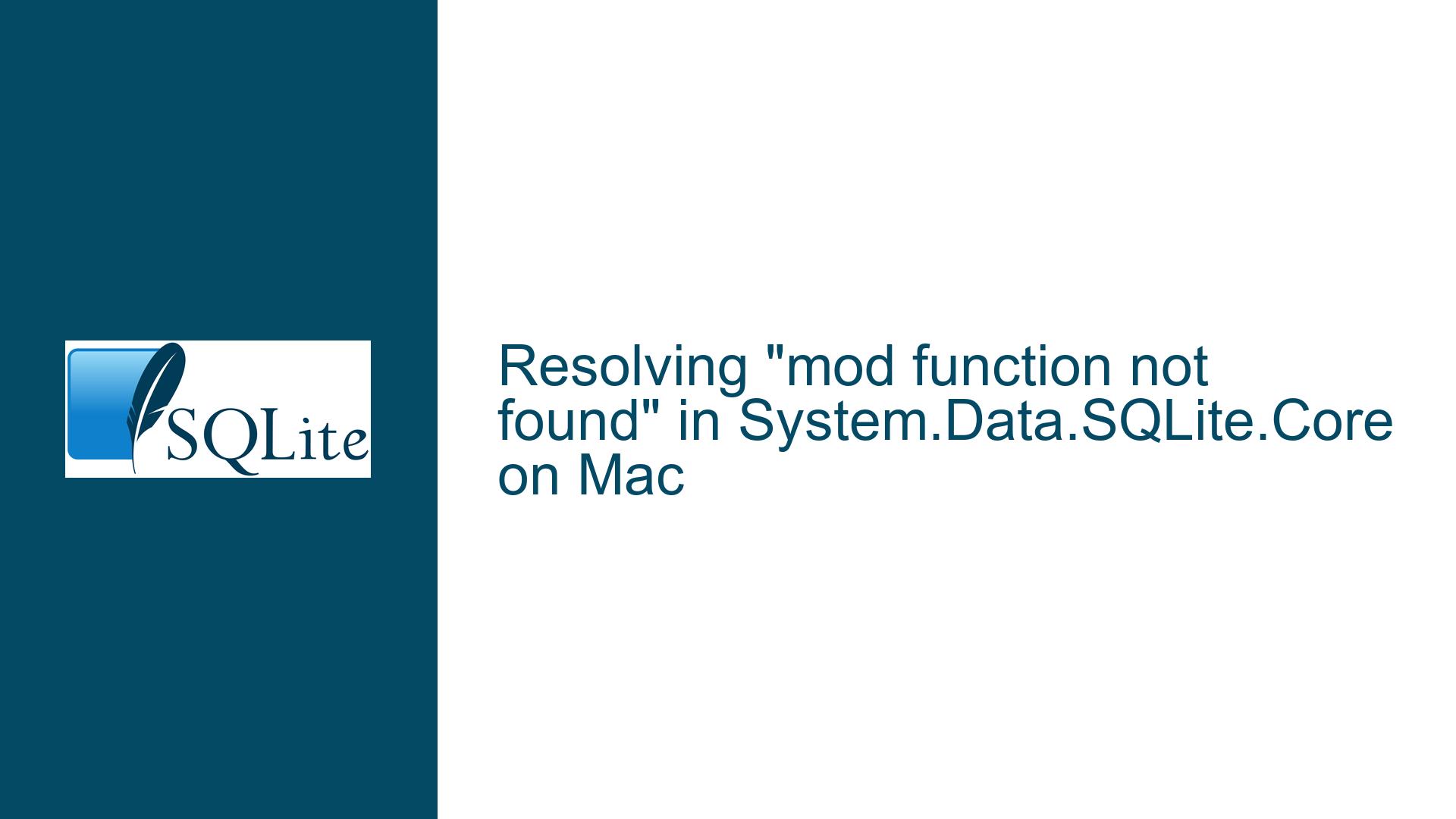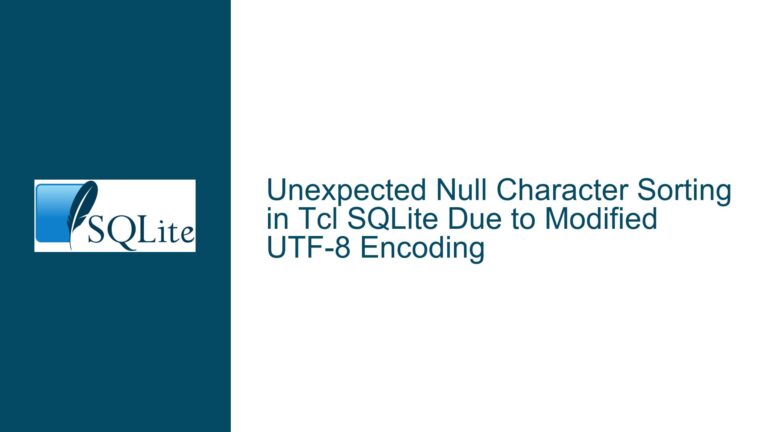Resolving “mod function not found” in System.Data.SQLite.Core on Mac
Issue Overview: Missing mod Function in System.Data.SQLite.Core on Mac
The core issue revolves around the mod function being unavailable in the System.Data.SQLite.Core library when running a .NET application on macOS, while the same function works seamlessly on Windows. The mod function, which calculates the remainder of a division operation, is a part of SQLite’s mathematical functions. Its absence on macOS suggests a discrepancy in how the System.Data.SQLite.Core library was built or configured for different operating systems.
The problem manifests when executing SQL queries that rely on the mod function. On Windows, these queries execute without issue, but on macOS, they fail with the error message "mod function not found." This inconsistency indicates that the macOS version of the library lacks the necessary compilation flags or configurations to include SQLite’s mathematical functions, specifically the mod function.
This issue is not a bug in SQLite itself but rather a configuration or build issue in the System.Data.SQLite.Core library. The absence of the mod function points to the library being compiled without the SQLITE_ENABLE_MATH_FUNCTIONS preprocessor symbol, which is required to enable SQLite’s built-in mathematical functions, including mod.
Possible Causes: Why the mod Function is Missing on Mac
The absence of the mod function in System.Data.SQLite.Core on macOS can be attributed to several potential causes, each rooted in the library’s build process or configuration. Understanding these causes is critical to diagnosing and resolving the issue effectively.
1. Missing SQLITE_ENABLE_MATH_FUNCTIONS Compilation Flag
The most likely cause is that the System.Data.SQLite.Core library was compiled without the SQLITE_ENABLE_MATH_FUNCTIONS preprocessor symbol. This symbol is required to enable SQLite’s mathematical functions, including mod. Without this flag, the mathematical functions are excluded from the build, resulting in the "mod function not found" error.
The SQLITE_ENABLE_MATH_FUNCTIONS flag is not enabled by default in SQLite builds. It must be explicitly defined during the compilation process. If the maintainers of System.Data.SQLite.Core did not include this flag in their build configuration for macOS, the resulting library would lack the mod function and other mathematical functions.
2. Platform-Specific Build Configurations
Another possible cause is platform-specific build configurations. System.Data.SQLite.Core may have different build settings for Windows and macOS. For example, the Windows build might include the SQLITE_ENABLE_MATH_FUNCTIONS flag, while the macOS build does not. This discrepancy could arise from differences in build scripts, target environments, or even oversight by the library maintainers.
Platform-specific configurations are common in cross-platform libraries, but they can lead to inconsistencies if not managed carefully. In this case, the macOS build of System.Data.SQLite.Core appears to have been optimized or configured differently, resulting in the exclusion of the mod function.
3. Dependency on Prebuilt Binaries
System.Data.SQLite.Core may rely on prebuilt SQLite binaries for different platforms. If the prebuilt binaries for macOS were compiled without the SQLITE_ENABLE_MATH_FUNCTIONS flag, the resulting library would lack the mod function. This dependency on prebuilt binaries can introduce inconsistencies, especially if the binaries are not built with the same configuration across platforms.
Prebuilt binaries are often used to simplify the distribution and installation of libraries, but they can also introduce issues if the build configurations are not standardized. In this case, the macOS binaries may have been built with a minimal configuration, excluding optional features like mathematical functions.
4. Lack of Custom Builds by Developers
Developers using System.Data.SQLite.Core may not be building the library from source but instead relying on prebuilt versions provided by the library maintainers. If the prebuilt versions do not include the mod function, developers may encounter the "mod function not found" error. This reliance on prebuilt binaries limits the ability to customize the library’s features and configurations.
Building the library from source allows developers to enable or disable specific features, such as mathematical functions, by defining the appropriate preprocessor symbols. However, this requires additional effort and expertise, which may deter some developers from pursuing this option.
Troubleshooting Steps, Solutions & Fixes: Enabling the mod Function in System.Data.SQLite.Core on Mac
Resolving the "mod function not found" issue requires addressing the root cause, which is the absence of the SQLITE_ENABLE_MATH_FUNCTIONS flag in the macOS build of System.Data.SQLite.Core. Below are detailed steps to troubleshoot and fix the issue, ranging from quick workarounds to more comprehensive solutions.
1. Verify the Current Build Configuration
The first step is to verify whether the System.Data.SQLite.Core library was built with the SQLITE_ENABLE_MATH_FUNCTIONS flag. This can be done by inspecting the library’s build scripts or documentation. If the flag is missing, it confirms that the mathematical functions, including mod, were excluded from the build.
To check the build configuration, locate the source code or build scripts for System.Data.SQLite.Core. Look for the presence of the SQLITE_ENABLE_MATH_FUNCTIONS flag in the compilation settings. If the flag is absent, it explains why the mod function is unavailable on macOS.
2. Rebuild System.Data.SQLite.Core with the SQLITE_ENABLE_MATH_FUNCTIONS Flag
If the current build configuration does not include the SQLITE_ENABLE_MATH_FUNCTIONS flag, the most effective solution is to rebuild the library with the flag enabled. This requires obtaining the source code for System.Data.SQLite.Core and modifying the build configuration to include the flag.
To rebuild the library, follow these steps:
- Clone or download the source code for System.Data.SQLite.Core from its repository.
- Locate the build configuration files (e.g.,
CMakeLists.txt,Makefile, or.csprojfiles). - Add the
SQLITE_ENABLE_MATH_FUNCTIONSflag to the compilation settings. For example, in aCMakeLists.txtfile, you might add the following line:add_definitions(-DSQLITE_ENABLE_MATH_FUNCTIONS) - Build the library using the appropriate build tools for your platform (e.g.,
cmake,make, ordotnet build). - Replace the existing System.Data.SQLite.Core library in your .NET application with the newly built version.
Rebuilding the library ensures that the mod function and other mathematical functions are included, resolving the "mod function not found" error.
3. Use Side-by-Side Installation of a Custom SQLite Build
If rebuilding System.Data.SQLite.Core is not feasible, an alternative solution is to use a side-by-side installation of a custom SQLite build that includes the mod function. This approach involves building SQLite from source with the SQLITE_ENABLE_MATH_FUNCTIONS flag and configuring your .NET application to use the custom build.
To implement a side-by-side installation:
- Download the SQLite source code from the official SQLite website.
- Build SQLite with the
SQLITE_ENABLE_MATH_FUNCTIONSflag enabled. For example, using the following command:gcc -DSQLITE_ENABLE_MATH_FUNCTIONS -o libsqlite3.so sqlite3.c -shared -fPIC - Place the custom SQLite library (e.g.,
libsqlite3.soorlibsqlite3.dylib) in a directory accessible to your .NET application. - Configure your .NET application to load the custom SQLite library at runtime. This can be done using platform invocation services (P/Invoke) or by modifying the application’s configuration files.
Using a side-by-side installation allows you to leverage the mod function without modifying the System.Data.SQLite.Core library.
4. Replace the mod Function with Equivalent SQL Logic
If rebuilding the library or using a custom SQLite build is not an option, you can work around the missing mod function by replacing it with equivalent SQL logic. The mod function calculates the remainder of a division operation, which can be replicated using the % operator or a combination of arithmetic operations.
For example, the following query using the mod function:
SELECT mod(column_name, 2) FROM table_name;
Can be rewritten using the % operator:
SELECT column_name % 2 FROM table_name;
If the % operator is also unavailable, you can use arithmetic operations to achieve the same result:
SELECT column_name - (column_name / 2) * 2 FROM table_name;
This workaround ensures that your queries produce the desired results without relying on the mod function.
5. Contact the Maintainers of System.Data.SQLite.Core
If you are unable to resolve the issue yourself, consider reaching out to the maintainers of System.Data.SQLite.Core. Provide detailed information about the problem, including the error message, the platform (macOS), and the steps to reproduce the issue. Request that they include the SQLITE_ENABLE_MATH_FUNCTIONS flag in future builds of the library.
Engaging with the maintainers can lead to a long-term solution, especially if other developers are experiencing the same issue. However, this approach may not provide an immediate fix, so it should be pursued in conjunction with other troubleshooting steps.
6. Evaluate Alternative Libraries or Databases
If the issue persists and none of the above solutions are viable, consider evaluating alternative libraries or databases that meet your requirements. For example, you could switch to a different SQLite library for .NET that includes the mod function or explore other lightweight databases that support the necessary mathematical functions.
When evaluating alternatives, consider factors such as compatibility, performance, and ease of integration with your .NET application. Ensure that the chosen library or database provides the features you need and is actively maintained.
By following these troubleshooting steps and solutions, you can resolve the "mod function not found" issue in System.Data.SQLite.Core on macOS. Whether you choose to rebuild the library, use a custom SQLite build, or implement a workaround, the key is to address the root cause and ensure that your application functions consistently across platforms.






